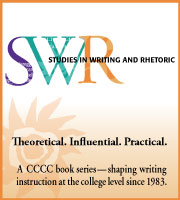Welch, Nancy. “Playing with Reality: Writing Centers after the Mirror Stage.” CCC 51.1 (1999): 51-69.
Abstract:
Between the daily reality and theoretical visions of writing center work, Welch points to disharmonies that perpetuate the opinion in the field for centers to “get real” and abandon high ideals and theories to teach “practical writing.” Using Lacan and psychoanalytical theories of object-relation development, Welch juxtaposes these arguments to pursue the practical with the potential for productive investigation and change in the gap between theory and practice, unsettling current ideas about students and writing.
Keywords:
ccc51.1 Writing Centers Tutors JLacan Mirror Stage Assignments Play Students Structure Ego Psychology Space
-
Works Cited
- Bartholomae, David. “Inventing the University.” When a Writer Can’t Write. Ed. Mike Rose. New York: Guilford, 1985. 134-65.
- Benjamin, Jessica. Like Subjects, Love Objects: Essays on Recognition and Sexual Difference. New Haven: Yale UP, 1995.
- Bruffee, Ken. “Peer Tutoring and the ‘Conversation of Mankind.'” Writing Centers: Theory and Administration. Ed. Gary A. Olson. Urbana: NCTE, 1984. 3-15.
- Copjec, Joan. “Cutting Up.” Between Feminism and Psychoanalysis. Ed. Teresa Brennan. London: Routledge, 1989. 227-46.
- Freud, Sigmund. Dora: An Analysis of a Case of Hysteria. New York: Collier, 1962.
- —. “Creative Writers and Day-Dreaming.” Standard Edition of the Complete Psychological Works of Sigmund Freud (Vol. 9). Ed. and trans. James Strachey. London: Hogarth, 1962. 141-54.
- —. “The Ego and the Id.” Standard Edition of the Complete Psychological Works of Sigmund Freud (Vol. 19). Ed. and trans. James Strachey. London: Hogarth, 1962. 1-66.
- Grimm, Nancy Maloney. ” Rearticulating the Work of the Writing Center .” CCC 47 (1996): 523-48.
- Harris, Muriel. “Talking in the Middle: Why Writers Need Writing Tutors.” College English 57 (1995): 27-42.
- Haynes-Burton, Cynthia. “‘Hanging Your Alias on Their Scene’: Writing Centers, Graffiti, and Style.” Writing Center Journal 14 (1994): 112-24.
- Lacan, Jacques. Ecrits: A Selection. Trans. Alan Sheridan. New York: Norton, 1977.
- Laing, R. D. The Divided Self. New York: Pantheon, 1969.
- North, Stephen. “The Idea of a Writing Center.” College English 46 (1984): 433-46.
- —. “Revisiting ‘The Idea of a Writing Center.'” The Writing Center Journal 15 (1994): 7-19.
- Stern, Daniel. The Interpersonal World of the Infant: A View from Psychoanalysis and Developmental Psychology. New York: Basic, 1985.
- Warnock, Tilly, and John Warnock. “Liberatory Writing Centers: Restoring Authority to Writers.” Writing Centers: Theory and Administration. Ed. Gary A. Olson. Urbana: NCTE, 1984. 16-23.
- Winnicott, D. W. Playing and Reality. London: Tavistock, 1971.
- —. Holding and Interpretation: Fragment of an Analysis. New York: Grove, 1986.
- Wright, Elizabeth. Psychoanalytic Criticism: Theory in Practice. London: Routledge, 1989.
Yagelski, Robert P. “The Ambivalence of Reflection: Critical Pedagogies, Identity, and the Writing Teacher.” CCC 51.1 (1999): 32-50.
Abstract:
Yagelski examines the self-doubt of teachers struggling to be sensitive and empowering. This “reflective practice” in teaching that has become “an essential part of being an effective writing teacher” (34) offers the opportunity to use the doubt to gain insight into the teacher-student relationship, institutional teacher identity, and the generative results of a writing class where the needs and abilities of the student are at the center of the teaching.
Keywords:
ccc51.1 Teachers Students Pedagogy PFreire Identity Zen Doubt CriticalPedagogy
-
Works Cited
- Berlin, James. “Not a Conclusion: A Conversation.” Into the Field: Sites of Composition Sudies. Ed. Anne Ruggles Gere. New York: MLA, 1993. 193-206.
- Brannon, Lil. “M[other]: Lives on the Outside.” Written Communication 10 (1993): 457-65.
- Brannon, Lil and C. H. Knoblauch. Critical Teaching and the Idea of Literacy. Portsmouth: Heinemann, 1993.
- Clifford, John. “The Subject in Discourse.” Patricia Harkin and John Schilb, eds. Contending With Words: Composition and Rhetoric in a Postmodern Age. New York: MLA, 1991. 38-51.
- Elbow, Peter. Embracing Contraries: Explorations in Learning and Teaching. New York: Oxford UP, 1986.
- Ellsworth, Elizabeth. “Why Doesn’t This Feel Empowering? Working Through the Repressive Myths Of Critical Pedagogy.” Harvard Educational Review 59 (1989): 297-324.
- Fox, Thomas J. The Social Uses of Writing: Politics and Pedagogy. Norwood: Ablex, 1990.
- Freire, Paulo. A Pedagogy of Hope. Trans. Robert R. Barr. New York: Continuum, 1994.
- —. Pedagogy of the Oppressed. Trans. Myra Ramos. New York: Continuum, 1984.
- Giroux, Henri. “Radical Pedagogy and the Politics of Student Voice.” Interchange 17 (1986): 48-69.
- Hairston, Maxine. “Diversity, Ideology, and Teaching Writing.” CCC 43 (1992): 179-93.
- hooks, bell. Teaching to Transgress: Education as the Practice of Freedom. New York: Routledge, 1994.
- Hourigan, Maureen M. Literacy as Social Exchange: Intersections of Class, Gender, and Culture. Albany: State U of New York P, 1994.
- Knoblauch, C. H. “Critical Teaching and Dominant Culture.” C. Mark Hurlbert and Michael Blitz, eds. Composition and Resistance. Portsmouth: Boynton, 1991. 12-21.
- Mayher, John S. Uncommon Sense: Theoretical Practice in Language Education. Portsmouth: Heinemann, 1990.
- Miller, Richard E. “The Arts of Complicity: Pragmatism and the Culture of Schooling.” College English 61 (1998): 10-28.
- Olson, Gary. “bell hooks and the Politics of Literacy: A Conversation.” Gary Olson and Irene Gale, eds. Philosophy, Rhetoric, Literary Criticism: (Inter)views. Carbondale: Southern Illinois UP, 1994. 81-99.
- Reps, Paul. Zen Flesh, Zen Bones. New York: Doubleday, 1961.
- Shainberg, Lawrence. Ambivalent Zen: One Man’s Adventures on the Dharma Path. New York: Vintage, 1995.
- Schön, Donald A. Educating the Reflective Practitioner. San Francisco: Jossey-Bass, 1987.
- —. The Reflective Practitioner. New York: Basic, 1983.
- Shor, Ira. Critical Teaching and Everyday Life. Chicago: U of Chicago P, 1980.
- Smith, Jeff. “Students’ Goals, Gatekeeping, and Some Questions of Ethics.” College English 59 (1997): 299-320.
- Tobin, Lad. Writing Relationships: What Really Happens in the Composition Classroom. Portsmouth: Boynton, 1993.
- Tompkins, Jane. “Pedagogy of the Distressed.” College English 52 (1990): 653-60.
- Trungpa, Chogyam. Meditation in Action. Boston: Shambala, 1991.
- Weiser, Irwin. “Self-Assessment, Reflection, and the New Teacher of Writing.” Kathleen Yancey and Jane Smith, eds. Self Assessment and Development in Writing. Cresskill: Hampton P, forthcoming.
- Yancey, Kathleen. Reflection in the Writing Classroom. Logan: Utah State UP, 1998.
Bishop, Wendy. “Places to Stand: The Reflective Writer-Teacher-Writer in Composition.” CCC 51.1 (1999): 9-31.
Abstract:
Bishop exposes the tendency of “social epistemic hardliners” (12) to essentialize and oversimplify expressivist writers, theorists and teachers. She examines the many “personas” of the “teacher-writer, writer-teacher” (13), and calls for “more writing about our writing” (29) that includes dialogic interaction between expressivist and social constructionist methods and methodologies rather than placing them in opposition to one another.
Keywords:
ccc51.1 Writing Composition Teaching Expressivism PElbow DMurray Teachers Students Field Literature Reflection
-
Works Cited
- Brent, Doug. Reading as Rhetorical Invention: Knowledge, Persuasion, and the Teaching of Research-Based Writing. Urbana: NCTE, 1992.
- Bourdieu, Pierre. Distinction: A Social Critique of the Judgment of Taste. Trans. Richard Nice. Cambridge: Harvard UP, 1984.
- Corder, Jim W. “From Rhetoric into Other Studies.” Defining the New Rhetorics. Eds. Theresa Enos and Stuart C. Brown. Newbury Park: Sage 1993. 95-105.
- Fishman, Stephen M. and Lucille Parkinson McCarthy. “Is Expressivism Dead?” College English 54 (1992): 647-61.
- Frey, Olivia. “Beyond Literary Darwinism: Women’s Voices and Critical Discourse.” College English 52 (1990): 507-26.
- Foucault, Michel. “What Is an Author?” Modern Criticism and Theory: A Reader. Ed. David Lodge. New York: Longman, 1988. 197-210.
- Fulwiler, Toby. ” Looking and Listening for My Voice (Staffroom Interchange) .” CCC 41 (1990): 214-20.
- Gradin, Sherrie L. Romancing Rhetorics: Social Expressivist Perspectives on the Teaching of Writing. Portsmouth: Boynton, 1995.
- Geisler, Cheryl. “Exploring Academic Literacy: An Experiment in Composing.” CCC 43 (1992): 39-54.
- Haake, Katharine. “Claiming Our Own Authority.” AWP Chronicle 22 (2):1-3
- Hatlen, Burton. “Michel Foucault and the Discourse[s] of English. College English 50 (1988): 786-801.
- Hult, Christine. “Over the Edge: When Reviewers Collide.” Writing on the Edge 5.2 (1994): 24-28.
- Lloyd-Jones, Richard. “Who We Were, Who We Should Become.” CCC 43 (1992): 486-96.
- Lunsford, Andrea. “Toward a Mestiza Rhetoric: Gloria Anzaldúa on Composition and Postcoloniality.” JAC 18 (1998): 1-27.
- Lyne, William. “White Purposes.” Genre and Writing: Issues, Arguments, Alternatives. Wendy Bishop and Hans Ostrom, eds. Portsmouth: Boynton, 1997. 73-80.
- Knox-Quinn, Carolyn. ” Collaboration in the Writing Classroom: An Interview with Ken Kesey .” CCC 41 (1990): 309-17.
- Mongo, Lisa. “‘I Teach Writing’: Writing as Teacher in the Field of Composition.” Forum. (Winter 1998): A16-18. Special Section of CCC 49.1 (Feb. 1998).
- Murray, Donald M. “All Writing Is Autobiography.” CCC 42 (1991): 66-74.
- —. “A Preface on Rejection.” Writing on the Edge 5.2 (1994): 29-30.
- O’Donnell, Thomas. “Politics and Ordinary Language: A Defense of Expressivist Rhetorics.” College English 59 (1996): 423-39.
- Olson, Gary. “Encountering the Other: Postcolonial Theory and Composition Scholarship.” JAC 18 (1998): 45-55.
- Ostrom, Hans. “Countee Cullen: How Teaching Rewrites the Genre of ‘Writer'”. Genre and Writing: Issues, Arguments, Alternatives. Wendy Bishop and Hans Ostrom, eds. Portsmouth: Boynton, 1997. 93-104.
- Phillips, Donna Burns, Ruth Greenberg, and Sharon Gibson. ” College Composition and Communication : Chronicling a Discipline’s Genesis .” CCC 44 (1993): 443-65.
- Sanders, Scott Russell. “The Writer in the University.” AWP Chronicle 25 (1992): 1, 9-13.
- Scholes, Robert. Textual Power: Literary Theory and the Teaching of English. New Haven: Yale UP, 1986.
- Schwartz, Mimi. ” Wearing the Shoe on the Other Foot: Teacher as Student Writer .” CCC 40 (1989): 203-10.
- Seitz, James. “Roland Barthes, Reading, and Roleplay: Composition’s Misguided Rejection of Fragmentary Texts.” College English 53 (1991): 815-25.
- Stygall, Gail. ” Resisting Privilege: Basic Writing and Foucault’s Author Function .” CCC 45 (1994): 320-41.












